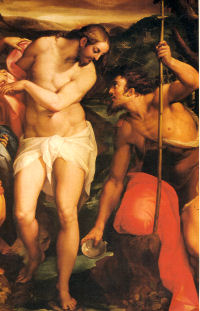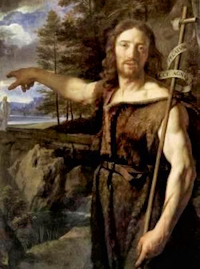» Enjoy our Liturgical Seasons series of e-books!
The next day he saw Jesus coming toward him and said, "Behold, the Lamb of God, who takes away the sin of the world. He is the one of whom I said, 'A man is coming after me who ranks ahead of me because he existed before me.' I did not know him, but the reason why I came baptizing with water was that he might be made known to Israel." John testified further, saying, "I saw the Spirit come down like a dove from the sky and remain upon him. I did not know him, but the one who sent me to baptize with water told me, 'On whomever you see the Spirit come down and remain, he is the one who will baptize with the holy Spirit.' Now I have seen and testified that he is the Son of God (Jn 1:29-34)."
Sunday Readings
The first reading is taken from the Book of the Prophet Isaiah 49:3, 5-6 and is the second of the "suffering servant" prophecies, found in Isaiah. These were prophecies uttered during the Babylonian exile to encourage the Jewish exiles to persevere in their trust in Yahweh, who would soon liberate them from Babylon, and eventually send them the long-expected Messiah, promised to Abraham.
The second reading is from the first Letter of Saint Paul to the Corinthians 1:1-3. The opening verses of this letter have been chosen for the reading because they show the prophecy, read in the first lesson, as fulfilled among the pagans, as well as emphasizing the purpose of the Messiah's coming: the sanctification and true enlightenment of all nations.
The Gospel is from St. John 1:29-34. The pages of the Gospel present John the Baptist as a symbolic example of a ‘bridegroom’s friend’, as Christ’s excellent and exemplary witness. The Baptist’s pre-eminent witness was affirmed in two ways: firstly with regard to the content of his testimony and secondly with respect to its style.
 With regard to the content of his testimony, the Baptist identified Jesus as ‘the Lamb of God who takes away the sins of the world’ (Jn 1:29). Anticipating Jesus’ messianic and salvific role, each of the four evangelists start their Gospels with the Baptist’s words. The Lamb refers to the idea of salvation. The Lamb is the gift of liberation that, following the flight from Egypt, the Israelites sacrificed to the Lord. The Lamb recalls the servant of the Lord, the messianic image described by the Prophet Isaiah, ‘like a lamb led to the slaughter-house, like a sheep dumb before its shearers’ (Is 53:7). The Lamb recalls the image of the Victorious Lamb in the Book of the Apocalypse who at the end of time will definitively destroy evil and sin. John the Baptist is therefore, an authoritative witness who knew Jesus’ exact identity and why He came amongst men.
With regard to the content of his testimony, the Baptist identified Jesus as ‘the Lamb of God who takes away the sins of the world’ (Jn 1:29). Anticipating Jesus’ messianic and salvific role, each of the four evangelists start their Gospels with the Baptist’s words. The Lamb refers to the idea of salvation. The Lamb is the gift of liberation that, following the flight from Egypt, the Israelites sacrificed to the Lord. The Lamb recalls the servant of the Lord, the messianic image described by the Prophet Isaiah, ‘like a lamb led to the slaughter-house, like a sheep dumb before its shearers’ (Is 53:7). The Lamb recalls the image of the Victorious Lamb in the Book of the Apocalypse who at the end of time will definitively destroy evil and sin. John the Baptist is therefore, an authoritative witness who knew Jesus’ exact identity and why He came amongst men.
With regard to John the Baptist’s style, St John’s Gospel (cfr Jn 3:28-29) presents St John the Baptist through the image of the ‘bridegroom’s friend’. He gives witness, yet is not positioned central to the events that are unfolding. His testimony is totally centralised on Christ. John indicates the presence of the Lord and then steps into the margins. ‘I am not the Christ’ and he goes on to affirm ‘I am the one who has been sent to go in front of him. 'It is the bridegroom who has the bride; and yet the bridegroom's friend, who stands there and listens to him, is filled with joy at the bridegroom's voice. This is the joy I feel, and it is complete. He must grow greater, I must grow less.’(Jn 3:28-30)
Today’s Gospel offers us an eloquent example to imitate, so that we can also become Christ’s authoritative witnesses. A believer can only give an authoritative witness if it coexists in perfect harmony with two of the Baptist’s evangelical qualities. Firstly, knowledge of Christ that is cultivated through prayer, the sacramental and ecclesial life, reading good books and edifying friendships. Secondly, the constant attributes of a ‘bridegroom’s friend’ who goes in search of the Groom through the virtue of humility because always, in everyone’s life, Christ must increase and we must decrease!
From the Congregation for the Clergy






